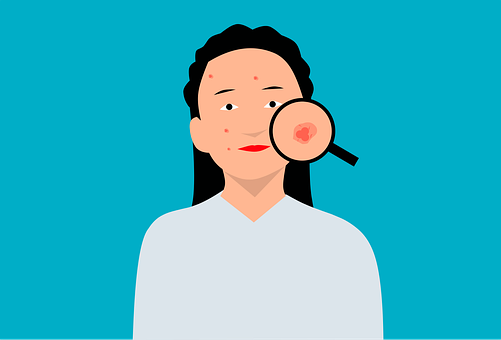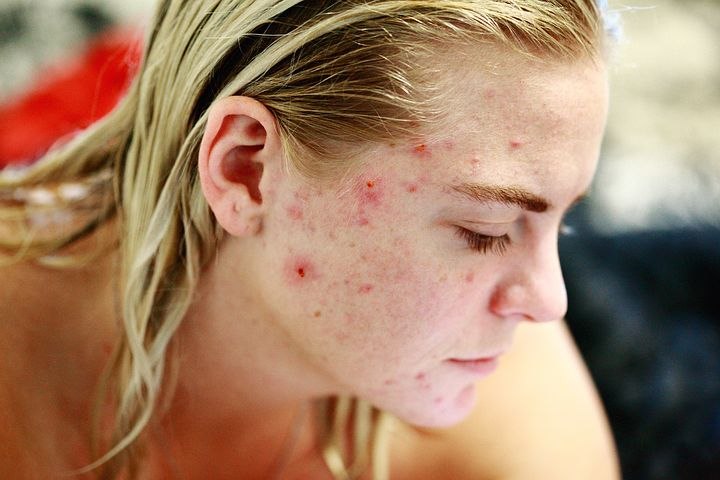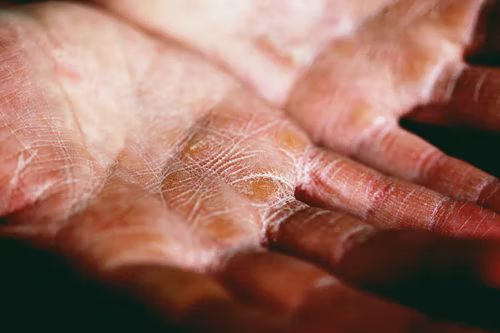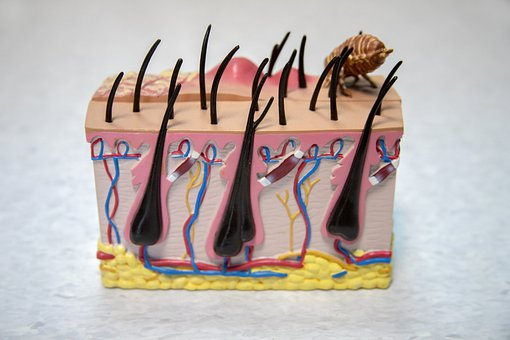The Symptoms and Remedies for the Most Common Skin Diseases
Disclaimer: The information provided here is for educational purposes only. We don't recommend using medication without a doctor's prescription.

Have you ever had a skin disease?
Skin diseases can be painful,
uncomfortable and embarrassing.
But they're also quite common. Approximately one in three adults in
the United States have skin problems such as eczema, acne, psoriasis, chickenpox and
various rashes that require regular medical attention.
Here's how a qualified telemedicine doctor can help you effectively manage the symptoms of
various skin infections.
1.Acne

People of all ages can suffer from acne flare-ups that cause blemishes when pores become clogged
with dirt and oil. While many teenagers experience breakouts during puberty due to hormonal
changes, adults also have acne because of genetics and other factors.
Acne usually affects the face, but it can also appear on your back, neck and chest. Mild cases
may cause nothing more than a few pimples at certain times of the month. A severe case of acne
may cause painful cysts and scarring that may last for years.
The most common acne treatments are topical creams and ointments prescribed by a general
practitioner or virtual doctor. The active ingredients in these products dry out the skin and
reduce the presence of bacteria that cause inflammation.
Our dermatologists may prescribe an oral medication for individuals with severe breakouts to
help clear up the problem. Also, you should never pop your pimples because it can lead to
scarring and infection.
2.Psoriasis
Psoriasis is usually caused by an overactive immune system which speeds up the growth cycle of skin cells. As a result, your body produces new skin cells too quickly and causes raised patches of red, inflamed skin.
Psoriasis comes in different forms including plaque (the most common form), guttate, inverse, pustular and erythrodermic. Some appear as small red dots that look like chickenpox.
Symptoms
- Raised red patches on the skin called plaques
- Scaly patches on the skin
- Red lesions
- Itching or burning sensation
Psoriasis can typically be managed using topical steroids or oral medications prescribed by your urgent care doctor or derma specialist.
3.Eczema

sEczema, also known as contact dermatitis, appears as a rash on the body, usually on the hands and feet, that can be red or discolored in nature.
People with eczema often experience itchiness as well as dry skin. Various things can trigger an eczema flare-up, including soaps and detergents, pollens, perfumes or colognes, and even certain fabrics like wool or synthetic fibers.
There is no cure for eczema, but treatments are available to manage the symptoms. Your virtual doctor may prescribe a short course of oral steroids for severe or widespread outbreaks.
Treatment also includes the use of moisturizers to keep your skin moist, anti-inflammatory medications such as topical corticosteroids (steroid creams) and antihistamines to help with itching. If there are infections, antibiotics will be prescribed to treat them.
4.Hyperhidrosis
Hyperhidrosis is the medical term for excessive sweating that can occur in any part of the body, but most often in the armpits, palms and soles. According to the American Academy of Dermatology, an estimated 2-3% of the American population suffers from hyperhidrosis.
Sweating excessively can leave one uncomfortable, and it can also cause social anxiety because it involves visible sweat on the face and other parts of the body.
There are various treatments, including topical prescription antiperspirants and oral medications for hyperhidrosis. But you shouldn't try to treat it on your own. Instead, see a reliable virtual doctor for diagnosis and treatment.
5.Skin Infection

The skin is the largest organ in the body and can be damaged by anything from sun exposure to acne. Blocked pores help trap bacteria, which can also lead to a skin infection. If you have acne or acne scars, those bumps and redness can also be a sign of an infection.
The most common skin diseases are usually minor and easily treated.
So, if you're having trouble with your skin, don't despair! Here are something's you can do to improve it:
.Exfoliate once a week
Exfoliation removes dead skin cells, making it easier for moisturizers to reach the surface of your skin and penetrate it better. It also helps clear any oil build-up that might be weighing down your pores.
.Cleanse your face
Cleanliness is another important defense against infection. If you're prone to acne, wash your face twice with a gentle cleanser to remove dirt and oil from skin pores.
.Moisturize daily
Moisturizing the surface of your skin is important because it makes it easier for water to reach the deeper layers of your epidermis and softens those dry, scaly patches of skin that cause itching and irritation.
.Use a sunscreen
Use sunscreen with a sun protection factor (SPF) of at least 30 or higher, even on cloudy days. A higher SPF protects against UVA rays, which contribute to the development of age-related diseases such as skin cancer and make sunburn more likely. Sun protection also reduces the risk of premature aging caused by UVB rays, which cause wrinkles and age spots.
.Consult a virtual doctor
Consulting a virtual doctor for the symptoms and remedies for your skin problems is an effective way to find out what's going on with your skin and how to treat it.
At TelMDCare, our expert online doctors offer virtual healthcare facilities, including dermatology services to treat skin infections and skin diseases like hyperhidrosis, eczema, psoriasis, and acne.
You can book a virtual healthcare appointment with us today or reach out to us to learn more about our services.